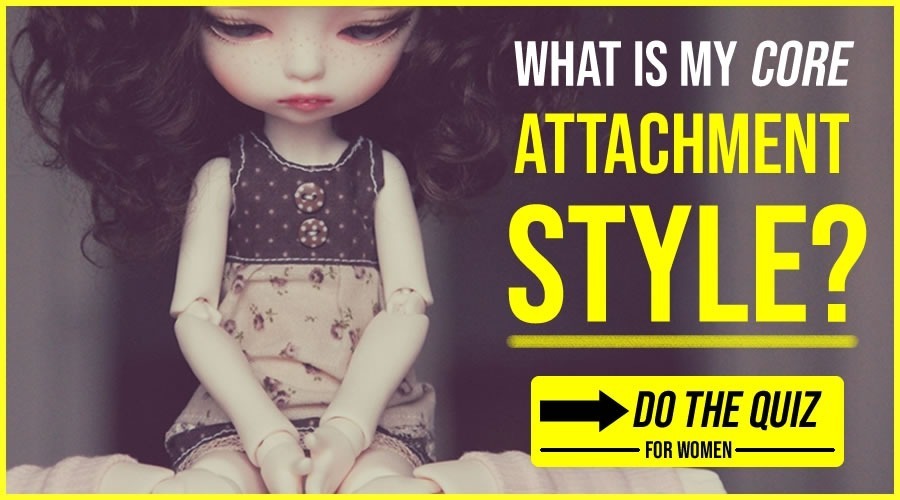NCRW
Secure Attachment Style: How It Develops + 12 Signs Of It
Author: Sarah Meyer & Renée Shen
A secure attachment style is a key resource when it comes to dating and relationships, and in life in general.
People with secure attachment styles are more likely to have lasting, satisfying marriages and relationships, to process breakups better if they have to, and to feel compassion and acceptance for themselves.
These patterns hold throughout the lifespan, despite the fact that secure attachment is evident by around 15 months of age.
Speaking more broadly, people with secure attachment styles are also more likely to feel competent in their careers, to experience their lives as meaningful, and to have positive memories late in life.
Even as infants, they are better at regulating their emotions, and tend to handle novelty and stress better.
Not surprisingly, securely attached individuals also report less distress at every point throughout their lives- as children, adolescents, young adults, as well as when they are elderly.
Table of Contents
How Is Secure Attachment Style Formed?
It is estimated that around 66% (⅔) of people in the U.S. (and other westernized nations) are securely attached.
But given that secure attachment is such a powerful predictor of happiness and success in relationships, how does it form?
Secure attachment forms in the context of the relationship between a baby and its primary caregiver(s) in the first few years of life.
Attachment is an evolutionary adaptation that mammals developed hundreds of thousands of years ago as mothers carried their babies, made milk for them, kept them warm, and protected them from predators.
While we do things very differently to our mammalian ancestors these days, many of the key elements of attachment remain the same.
Recommended: The 4 Types Of Attachment Styles & Which One Are You?
When mothers are physically and emotionally present and available for their infants, when they meet their infants’ needs, and are responsive to their cues enough of the time, infants develop trust in them.
They know that they can look to their mother to keep them safe and to help them orient themselves in their environment.
Over time, this sense of safety and trust generalizes to other people and to familiar places, as the child explores and becomes more independent.
In this way, it is through a relationship with their mother that infants begin to interact with the people and objects around them.
If you have a secure attachment style, you probably grew up with a mother or primary caregiver who was attuned and attentive to you.
No one is perfect, and good mothers make many mistakes, but if your mother was responsive to you about 30-50% of the time, that’s probably enough for you to have formed a secure attachment with her.
As an adult, unless something went very wrong in your early romantic encounters, that secure attachment will continue to provide a template for your future close relationships.
What Are The Greatest Benefits Of A Secure Attachment Style?
Having a secure attachment style will usually mean that you are better adjusted socially and psychologically than those who exhibit insecure attachment patterns.
In relationships, you will naturally seek closeness and connection with your partner, and you will be better able to cope with stress, novelty, and change.
You will be less likely to act out of fear or defensiveness, especially when the fear is unfounded, and you will be more empathetic towards your partner.
Because you are not wasting all your mental energy dealing with anxiety and (imaginary) threats, you will also be better placed to understand your partner’s motivations and behaviour.
Of course, men are different from women, and it’s normal to find yourself worrying about little things he does that don’t quite map on to your expectations and perspective as a woman.
But with a secure attachment, you will find it easier to consider a man’s point of view, and you will be better equipped to handle the conflicts and challenges that arise in your relationship.
It isn’t always obvious if you have a secure attachment style, as some degree of difficulty connecting and communicating is normal in relationships.
We do have a specially crafted, women-specific quiz that will help you discover your unique attachment style, so you can find out for sure:
QUIZ TIME: What is my core attachment style? CLICK HERE to find out with our specially crafted women-specific 10 Question Quiz!
(Why is this important? It is because your core attachment style largely dictates and influences what happens in your relationship. Thus it’s imperative you understand your core attachment style!)
No Person Or Relationship Is Perfect…
We can never understand each other perfectly, and we all carry different kinds of baggage.
Rather than being entirely in your control, the patterns in your relationship will reflect an interaction between your own tendencies and your partner’s, as well as the roles and habits you fall into as a couple.
To help you work out whether you generally have a secure attachment style, let’s look at 11 signs of secure attachment.
11 Signs Of Secure Attachment Style
Sign #1: Your Default State Is Trust
When you have a secure attachment to your primary caregiver, this means that you can trust them to care about you, and to respond to you when you need something.
In adulthood, this default state of trust carries over to close relationships with others, as you operate from the general belief that the people that you invest in will invest in you in return.
Of course, I’m talking about trust in a particular context here- when you have built up a strong connection with someone and you’ve developed a certain level of familiarity with them.
Trusting other people indiscriminately, inappropriately, or without establishing a special bond with them over time, is actually more indicative of insecure attachment and poor attunement to others.
When a romantic partnership has been established and your partner has proven themselves to you consistently, however, it is normal to experience a baseline level of trust with them.
This baseline trust then affords you some resilience when you face minor challenges or disruptions to your relationship.
For example, if your partner is committed to you, it is fair to assume that they made that commitment for a reason, and that they aren’t going to change their mind just because you burned the dinner or forgot to call them one time.
Similarly, if you and your partner have a strong connection and have a lot of positive interactions, you probably don’t need to be terrified when you disagree on something or experience some conflict.
If you can navigate these kinds of situations without becoming too distressed, and you find that your feelings of trust and closeness with your partner remain generally consistent over time, you probably have a secure attachment style.
You likely feel comfortable being open around your partner, and expecting them to be there for you- and you can remain in that state without too much effort.
For insecurely attached people, though, the situations I described above can feel a little like scaling a high building- scary and exhausting.
And in general, staying close to someone can feel like hard work.
MORE: How To Get Close To People? 5 Advanced Ways.
Sign #3: You Are Able To Ask For Help
If you’ve grown up believing that your needs are important and that you matter, it will be much easier for you to ask for help from others.
You will not be inclined to question everything you think and feel, or to justify everything you think you need at length before you are able to be open with other people about where you’re at.
Instead, for the most part, if you’re securely attached you will go into social interactions willing to share resources and energy with people, particularly as they earn your trust over time.
You will also feel confident expecting the same in return- provided the people you’re dealing with are normally altruistic, of course.
This is a huge asset when it comes to relationships and close friendships.
So much of the pain that we experience around intimacy and interdependence comes from our reluctance to burden others- to let them see us as we really are, and to admit to ourselves and to them that we aren’t always coping perfectly with everything.
This tendency to push people away or to keep them at arms’ length is responsible for so many disconnected or unsatisfying relationships.
Too many times, neither party realizes how much the other really does need and value them, until they’ve already decided they aren’t wanted and should probably move on.
If you’re securely attached, you will probably still want to present yourself in the best possible light to people when you meet them at first.
This is normal social behavior.
But as you get to know someone and you form a bond with them, you will find that you’re quite comfortable asking them for help with things if you need it- and that you happily return the favor when you get a chance.
When it comes to men and dating, this is a big deal, because men want to feel like you need them in your life (hence the hero instinct in men). They want to feel like they can solve your problems and make you happy.
Sign #4: You’re Comfortable With Banter
This isn’t a sign of secure attachment style that many people would think of, but it’s an important one.
Banter is defined as the playful and friendly exchange of teasing remarks.
In the case of banter used inside of an intimate relationship, playful banter can:
- Help you build emotional attraction with a man
- Build romantic tension
- Connect on a deeper level with a man, in a way that he resonates with; and
- Most importantly, weed out the toxic, weak and low value men
But many people have a negative reaction of fear towards banter, and always assume bad intent.
These are the people who are insecurely attached. So why are they less able to stomach playful or teasing remarks?
Because of the stress and fear in their body, that is present often and can be easily triggered.
Because they find it hard to distinguish between good and bad intent, due to not being able to be present emotionally.
Lastly, also because insecurely attached people may believe deep down inside that they are not worthy of connection, when someone teases them even playfully, they can shut down, accuse them of being immature, or just balk.
Banter is a style of communication that humans gradually grow into as they mature into adults.
This doesn’t mean that if you don’t banter, that you’re definitely insecurely attached, not at all. Perhaps you’re just not in the habit of bantering and don’t understand the value of it.
It just means that at some point in our childhood, we all evolve a sense of back-and-forth teasing communication just through play, and eventually, flirting.
But due to being insecurely attached, some people use up too much valuable energy on anxiety (especially those with anxious attachment style), and never get to develop that relaxed and playful part of themselves.
So if you find that you reject banter, and get defensive quite easily even when someone is joking with you, then there’s a chance you may have insecure attachment style.
On that note, high value banter is the most important online and in person dating tool for you as a woman.
We call it the dark feminine art of high value banter, and it will help you weed out the low quality people whilst creating emotional attraction with the BEST of men.
If you don’t know what the dark feminine art of high value banter is, take our free class here. (Renee's husband David runs this free class and I highly recommend you listen to it.)
Not sure why high value banter weeds out the poor quality guys whilst making you super attractive to the high value guys? CLICK to find out here.
Sign #5: You Can Handle Time Apart
If you’re securely attached, you probably handle temporary separations from your partner reasonably well.
You understand your partner’s need for freedom and autonomy, and you don’t feel like you’re falling apart if they aren’t around all the time.
This pattern is likely due to the fact that in childhood, you learned that when your mother or primary caregiver left you for short periods of time, or simply stopped paying attention to you to focus on something else, she would reliably come back.
And importantly, she would return to you happy and available to connect- at least enough of the time.
In cases of neglect or abuse, in contrast, an infant frequently experiences maternal withdrawal, and often does not know when they will next receive attention or love.
They may also be exposed to situations where their mother pulls away from them to punish them for her own negative emotions or stress.
This relative resilience in the face of temporary separation could have something to do with the fact that securely attached individuals may get more out of the time they spend with their partner than insecurely attached individuals.
One study that looked at sympathetic nervous system arousal (a basic measure of physiological stress), showed that on average, young adults experienced reduced stress and anxiety at times of day when their partner was present.
This reduction in stress was evident for individuals of any attachment style, but was particularly dramatic for securely attached individuals.
So while most participants had lower levels of stress during the parts of the day that they spent with their partner, securely attached participants enjoyed the greatest calming effect.
It’s possible that getting a lot out of regular interactions with your partner means that you’re more able to cope with temporary disruptions to your connection with them.
At any rate, this seems to be another benefit of a secure attachment style.
Sign #6: You Are Comfortable With A Range Of Emotions
The way you deal with emotions says a lot about your attachment style.
In infancy, we learn to regulate our emotions through the bond that we form with our mother or primary caregiver- even in the collaborative act of breastfeeding.
Mothers of securely attached children are attuned to their babies’ emotions, and help modulate responses to emotionally activating scenarios through facial expression, gesture, and tone of voice.
Ideally, mothers soothe their infants when they are upset, but also encourage their infants to explore and to develop independence, even if the infants have to struggle and get frustrated as they learn.
This process helps children learn to handle a range of emotions.
As an adult, if you are securely attached you will feel reasonably comfortable with both positive and negative emotions.
You won’t cut and run the moment you feel a bit of fear and uncertainty in your relationship.
You’ll also be able to stay calm and regulated while comforting or supporting your partner through difficult times, and you will be able to handle short-term separations from your partner without being afraid to feel their absence.
In contrast, these kinds of situations are all very triggering to people with more insecure attachment patterns.
Related: 13 Proven Signs Of Attachment Issues In Adults & How To Fix It For Good.
Of course, this is a matter of degree, because no-one enjoys negativity and pain, and sometimes we all experience more than we’re able to cope with.
What I am talking about is not feeling cool and calm and unaffected by others’ emotions, but simply responding to them with a normal level of sensitivity.
You may still feel bad and wish things were different, but can you cope?
Can you remain present and connected to your partner when you go through these things?
Can you admit that your emotions are what they are, and that you aren’t always in control?
If so, you’re probably securely attached.
Also crucial to mention is that when you’re comfortable with a range of emotions, you’re comfortable with vulnerability.
And when you’re comfortable with vulnerability, that’s a big advantage in dating, because you’ll be able to inspire a deep emotional commitment in a man.
In fact, there’s actually one specific emotional trigger within every man that makes him WANT to commit to one woman and take care of her - for life.
Do you know what this one specific emotional trigger is?
Sign #7: You Don’t Push Your Partner Away
When you become emotionally dysregulated or triggered and you don’t have good skills for processing your emotions, you may resort to pushing others away.
Here are 7 signs you push people away (and why).
Pushing others away is a pattern typically associated with insecure attachment.
It means that when things get difficult for you, you feel out of control.
And when you feel out of control, you want to hide the intensity of your emotions, so you might cope by shutting others out or running away.
You might also push them away by:
- Getting angry
- Acting out
- Punishing or criticising them; or
- Rejecting them in passive aggressive ways
If you’re securely attached, you are less likely to do this.
Instead of running away, you know how to draw on social support when you’re struggling.
You’ll also cope with hardship by seeking proximity with people that you’re close to.
You will do this even if it makes your negative emotions seem more real or magnified, because you value connection.
You will be more honest about what you’re going through.
You’ll also be comfortable admitting to failure and or that you’re suffering to people you trust, and you will expect other people to respond in supportive ways.
Sign #8: You Don’t Pretend To Be Perfect
Because secure attachment is associated with better self-esteem, it makes sense that securely attached people don’t need to pretend to be perfect in order to connect with others.
Instead of making sure that you always look good, your house is always clean, and you know what to say and do, you will be much more flexible about when and how you interact with other people.
You won’t need to stay home just because you feel fat today.
You’ll be able to have people over without deep cleaning your home first.
And when you get sick, experience unemployment, failure, or a relationship breakdown, you will still be able to face other people.
In a relationship, this flexibility will mean that you are able to admit when you make a mistake or treat your partner badly.
You will be able to tolerate your own flaws, at least some of the time.
You also will not need to feel that your hair, makeup, and body are perfect before you have sex, and you won’t be obsessing over how your facial expressions look.
Instead, you’ll feel free to enjoy yourself.
Of course, you can’t be expected to be this comfortable early on in a relationship, when it is normal to try to present as impressively as you can.
However, secure attachment will mean that as you grow closer to your partner, you will progressively drop the act or the mask.
And in fact, not trying to impress your partner or even your date may actually enhance your attractiveness anyway.
Trying too hard to impress a man early on could mean that you end up coming across as low value, because you can’t relax and connect to him.
When you can’t relax, you can’t really offer value or be your highest value self.
By the way, did you know that there are 7 common signs a woman is low value in the eyes of all men?
Do You Know What These 7 Signs Are & How to Avoid Them Like the Plague?
(Why is this important? Because men and women perceive value very differently and you don’t want to be making mistakes that would cause quality men to dismiss, abandon or alienate you.)
Sign #9: You Don’t Need Your Partner To Be Perfect
If you’re securely attached, you don’t insist on being perfect, and you don’t require your partner to be perfect either.
This means that when your partner makes mistakes or reveals his flaws, you’ll be able to stay connected to him.
Of course, it’s never a good thing to ignore signs that your partner might not be the right person for you.
Now is it good to ignore the signs that they might not be presenting with enough value for you to continue dating them.
At the early stages of a relationship, we’re still proving ourselves to each other, so you have to be open to seeing them for who they really are.
But once you have the connection and you’re in love, you want to feel like there is space for you both to make mistakes.
So if your partner says something stupid, forgets to do something he said he would do, or falls short of his goals, can you still accept him?
Do you show him loyalty and kindness?
Are you a soft place to land?
If so, you’re probably securely attached.
In contrast, if you’re turned off, critical, distant, and disrespectful towards your man when he fails, this can be a sign that you can’t tolerate his imperfections.
Sign #10: You Crave Real Connection
Do you value perfection, certainty, and having your partner take more risks in the relationship than you?
Do you require your partner to go first when it comes to spending time together or resolving conflict?
Or do you crave real connection- where each person seeks out the other, wanting to understand, rather than to control?
A need to control things is indicative of insecure attachment.
But if you’re securely attached, you will be willing to let go of your feelings of certainty and take risks to establish a connection with someone who is special to you.
You’ll know it’s a good thing to initiate, even as a woman.
MORE: Do Not Chase Him. Initiate In High Value Ways Instead.
If your partner goes quiet or pulls away for a bit, you’ll respond not only out of your own feelings of rejection, but from a place of caring about him and wanting to make sure he’s okay.
Instead of making demands or ignoring him to restore your sense of power, you’ll be more likely to reach out and offer support.
You will also be more likely to accept his feelings and state of mind, even if he doesn’t manage to articulate everything that’s going on for him.
This is because you are able to look at the situation without panicking and assuming the worst.
Similarly, if your partner says something critical about you or asks you to change something you’re doing, you won’t just freak out and push him away.
You will care about him enough to understand what he’s asking you to do, and how you’re making him feel- even if you don’t end up doing what he says.
Some signs that you’re seeking a real connection over just having a relationship for what you can take from it include:
- Wanting to share the less glamorous parts of yourself with your partner
- Being open to your own feelings- both euphoric love and deep pain
- Being open to your lover’s feelings
- Being authentic in the way you respond to things and not just trying to please your partner
- Disagreeing with your partner when you feel you disagree
- Seeking closeness and comfort from them
- Being open and expressive about how much you value your partner (provided you are in an established relationship and they have earned this from you)
Sign #11: You’re Happy
People with secure attachment styles are, on average, happier in their relationships than those with insecure attachment styles.
In particular, securely attached people report more joy in their interactions with their partner and in their reflections on their relationship.
So, if you find yourself euphoric on a regular basis- as is normal during the early stages of falling in love; if you have happy fantasies and spend time reliving positive memories with your partner, you may be securely attached.
Sign #12: You Get Less Jealous
Finally, when you’re securely attached, you will be less likely to be overcome with jealousy in your relationship.
In this context, jealousy specifically refers to the tendency to feel threatened and stressed by the presence of other attractive individuals in your partner’s life.
Plus what you decide to do about it.
One study showed that romantically committed college students who were asked to imagine relationship-threatening scenarios involving a third person, reported less distress if they had a secure attachment style, or traits of secure attachment.
They still experienced some negative emotion, of course, but this was less intense than for participants with insecure attachment styles.
The study suggested that the effects of jealousy for securely attached participants were mitigated by greater confidence in one’s own attractiveness, and more trust in the ability of their relationship to withstand a challenge.
Do You Harbour Insecure Or Secure Attachment Patterns?
If you’ve read through this list and you relate to most of these points (7 or more), you’re probably securely attached.
This means that you have a good set of tools to use to navigate relationships, and that your intuitions and natural reactions to relationship scenarios are probably fairly reliable.
This is a huge deal, because the rest of us have to do a lot of work to re-calibrate our attachment systems and to restore our authentic response to relationship stress.
This requires a lot of uncertainty and a lot of discomfort- but it is also a beautiful and rewarding process.
How Do I Become More Secure?
It’s worth remembering that attachment styles exist on a spectrum.
They are not set in stone, and we are not always doomed to be the victims of our patterns for the rest of our lives.
That said, a lot of people will indeed never do the work that they need to do to change, even while they intend to try…
This is because the process of changing is very uncomfortable, and it can be very hard to stick with it.
If you are going to try to change your attachment style, or even just to move a little closer to secure on the spectrum of attachment behavior, self-compassion seems to play a key role.
If you can practice a form of mindful self-compassion, where you notice your thoughts and reactions as they come up, you can begin to guide yourself towards trust and love, instead of being driven by fear and a need to control.
If you think you have insecure attachment patterns and want further support and insights, here’s a list of articles that will help:
Avoidant Attachment: Causes & 8 Obvious Adult Signs.
11 Anxious Attachment Triggers: Causes + How To Manage Them.
How To Overcome Anxious Preoccupied Attachment: 7 Proven Steps.
Anxious Avoidant Relationship: 7 Steps To Fix It & Should You?


Sarah Meyer
Sarah has a Masters in psychology and works as a special education advisor in early childhood. She lives in Auckland, New Zealand, with her partner and two children. She has a passion for evolutionary psychology, attachment theory, and personality psychology.
Renée Shen
Author & Editor For National Council for Research on Women. Founder of the popular women's dating & relationship advice website, The Feminine Woman.
P.S. I hope you've enjoyed this article. Here are some other articles that I think you'd really like too...
© Copyright National Council for Research on Women. All Rights Reserved



